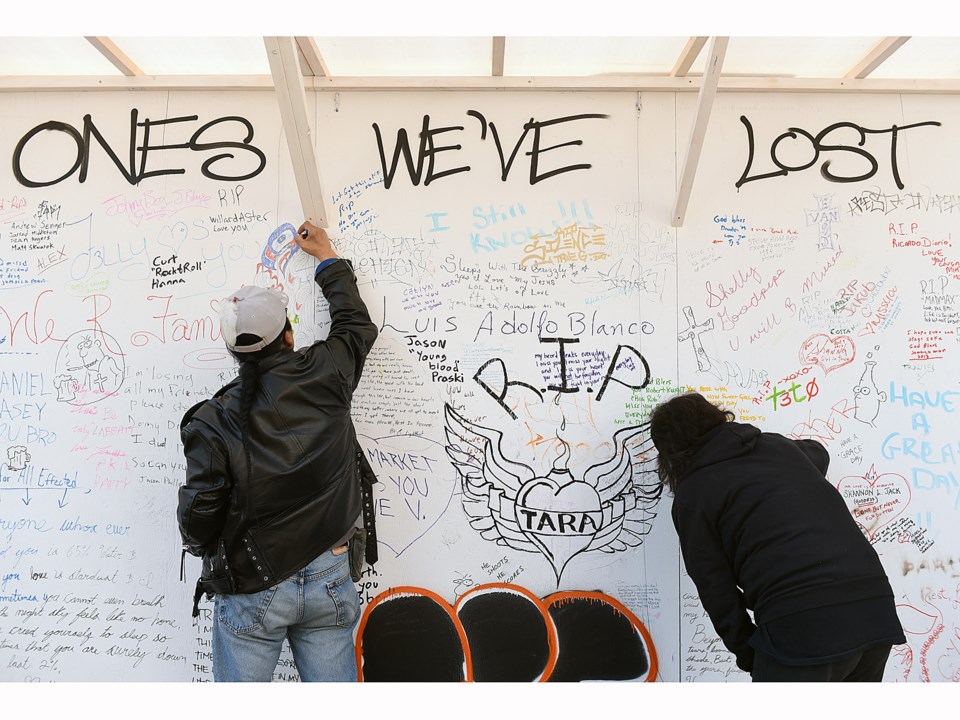There is a new weapon in the fight against fentanyl and the opioid crisis in Vancouver and across B.C.
On Oct. 17, the Vancouver Police Department and Odd Squad Productions released Understanding Fentanyl, a three-part documentary series aimed at educating students about the dangers of drug use, specifically opioids and fentanyl.
The three 20-minute films follow the stories of three families impacted by the crisis — two who have lost loved ones to an overdose and a father dealing with his son’s addiction — as well as the first responders dealing with the fentanyl fallout on a daily basis.
“Sadly fentanyl continues to kill people in our province every single day,” Vancouver Police Chief Adam Palmer said at a press conference, adding that so far this year there have been more than 1,000 overdose deaths in B.C. and he clearly remembers the beginning of the fentanyl crisis four years ago. It was the Thanksgiving long weekend in 2014 and police issued a warning after about a dozen people overdosed on what was believed to be high-grade heroin. A few days later test results showed that the substance was actually fentanyl.
In Vancouver alone, 26 people died of a suspected overdose last month, and 25 died in August. Overdose deaths in the city reached a historic high last year, with a total of 335 people suspected of dying of a drug overdose — more than 250 connected to fentanyl.
In the first video, Palmer says he thinks the fentanyl crisis will go down as the worst drug crisis in the country’s history.
Interestingly, Understanding Fentanyl was launched on Oct. 17, the same day recreational marijuana became legal in Canada, and just two days after the chief told reporters police in Vancouver and across the country are facing other pressing public safety issues.
“Please keep in mind that the enforcement of the new cannabis laws is not the only public safety issue for police agencies… there are other pressing public safety matters in our country that we are facing.”
At the press conference, Palmer said he has been encouraged by the response from the community and government to the crisis.
“New, innovative solutions introduced over the last year or so are undoubtedly saving lives. There are treatment options available in this province, or soon to be available, that simply were not an option at the beginning of the crisis,” he said, adding that while treatment is vital another key to reducing future risk, especially to young people, is education.
“That’s why, about a year-and-a-half ago VPD partnered with Odd Squad Productions to create an educational series for young people to help reduce the risk.”
Odd Squad Productions started in 1997 when a group of beat cops working in the Downtown Eastside came up with the idea to make an educational video about drug addiction, Through a Blue Lens. Since then the group has produced other documentaries and taken their message on the road, doing presentations at schools, in Indigenous communities and for other police and law enforcement personnel across Canada and around the world.
The group has been working on this project since 2015 and partnered with Safer Schools Together to develop the accompanying resource guide for teachers.
“What was important for us is that we didn’t just have a film for kids to watch but there were some lesson plans and there were some learned outcomes,” said Const. David Steverding, a VPD officer and member of the Odd Squad. He added that the group received enough funding to be able to provide a free copy of Understanding Fentanyl to every school in the province.
When asked if he thought the film would save lives, he said, “I think the one thing that’s long been overlooked is the value of prevention and education… I think there’s some value in it… We’re now talking to people that are in their 30s that saw Through a Blue Lens 20 years ago and they said it did have an impact on them and they did make a decision that they’re weren’t going to use [drugs] as a result of it. Is it an absolute solution? No. It’s one piece of the puzzle.”
@JessicaEKerr
jkerr@vancourier.com



